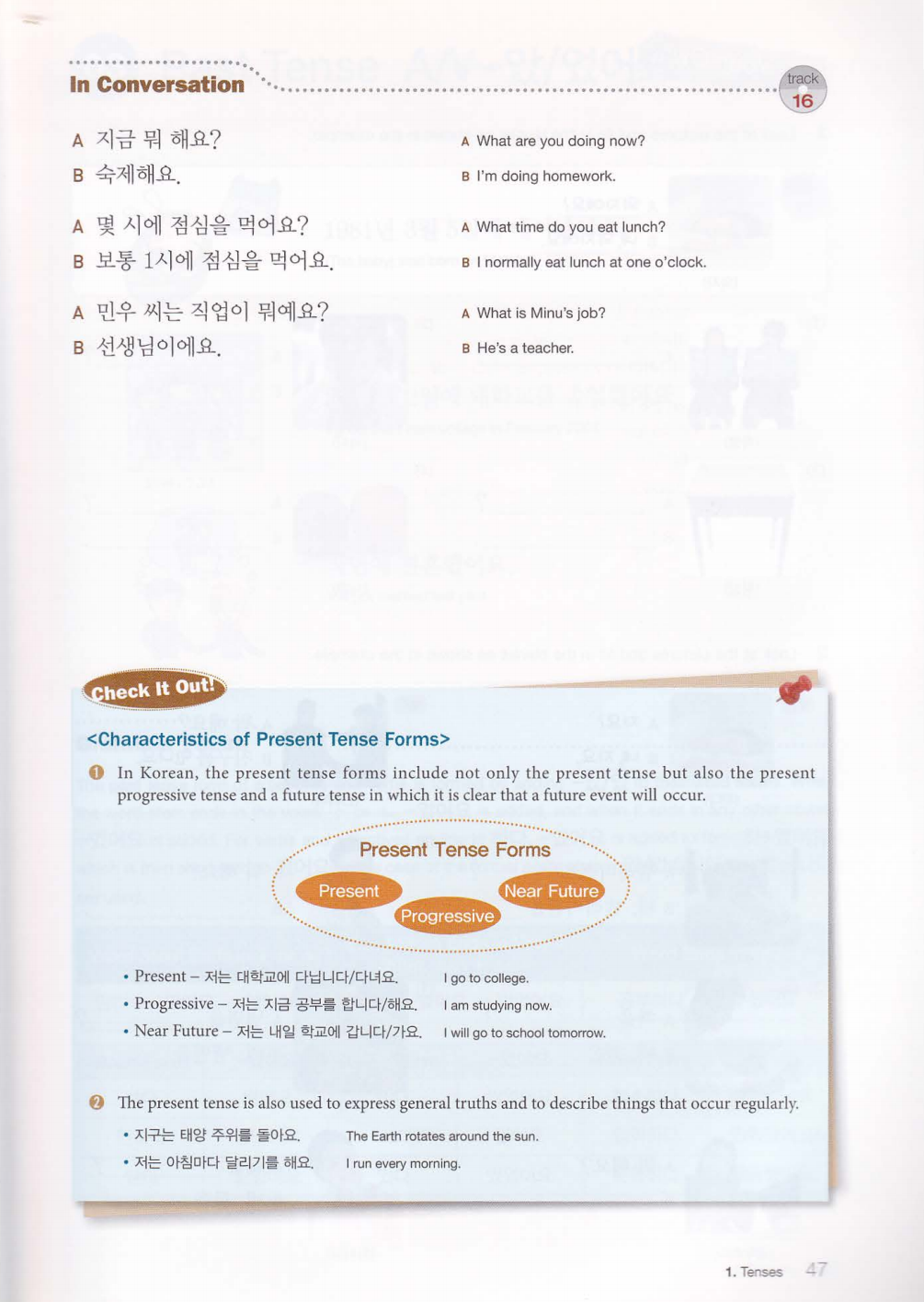PPLEB012. 1-2 Present Tense A/V-아/어요 - 220425MON


PPLEB012. 1-2 Present Tense A/V-아/어요 - 220425MON
교재 페이지 45-48
Unit 1. Tenses - 02 Present Tense A/V-아/어요




02 Present Tense A/V-아/어요
현재 시제 - Adjective (형용사) / Verb (동사) -아/어요
맛있어요?
Does it taste good?
네, 맛있어요.
Yes, it tastes good.
어디에 가요?
Where are you going?
학교에 가요.
I'm going to school.
사랑해요, 캐럴 씨.
I love you, Carol.
** Grammar Focus
The informal polite style is the honorific form used most in daily life.
Compared to the formal polite style, this style is softer and less formal and is therefore used mainly among family members, friends, and other close acquaintances.
The declarative and interrogative forms of the informal polite style are the same.
The declarative form is therefore made by ending the sentence in a falling tone while the interrogative form is made by ending the sentence in a rising tone.
1. -아요
아요 is used when the word stem ends in ㅏ or ㅗ.
(1) -아요 is added when the word stem ends in a consonant.
앉다 + 아요 -> 앉아요
받다 -> 받아요
살다 -> 살아요
(2) If the word stem ends in the vowel ㅏ,
one ㅏ is deleted.
가다 + 아요 -> 가요
자다 -> 자요
만나다 -> 만나요
끝나다 -> 끝나요
(3) If the word stem ends in a vowel,
the following contraction can also occur.
오다 + 아요 -> 와요 (오 + ㅏ요 -> 와요)
보다 -> 봐요
2. -어요
어요 is used when the word stem ends in a vowel other than ㅏ or ㅗ.
(1) -어요 is added when the word stem ends in a consonant.
읽다 + 어요 -> 읽어요
먹다 -> 먹어요
입다 -> 입어요
(2) If the word stem ends in the vowel ㅐ, ㅓ, or ㅕ,
the 어 of -어요 is deleted.
보내다 + (어)요 -> 보내요
지내다 -> 지내요
서다 -> 서요
켜다 -> 켜요
(3) If the word stem ends in the vowel ㅜ,
ㅜ and the 어 of 어요 combine to form ㅝ.
배우다 + 어요 -> 배워요 (배우 + ㅓ요 -> 배워요)
주다 -> 줘요
바꾸다 -> 바꿔요
(4) When the word stem ends in the vowel ㅣ,
ㅣ and the 어 of 어요 combine to form ㅕ.
마시다 + 어요 -> 마셔요 (마시 + ㅓ요 -> 마셔요)
기다리다 -> 기다려요
헤어지다 -> 헤어져요
3. -여요 -> 해요
When the predicate ends in 하다, it is changed to 해요.
(Originally, 여요 was added to 하 to form 하여요, but 하ㅕ요 is now shortened to 해요.)
말하다 -> 말해요
공부하다 -> 공부해요
전화하다 -> 전화해요
여행하다 -> 여행해요
일하다 -> 일해요
4. -예요 / 이에요
The verb 이다 changes to 예요/이에요, with 예요 used when the preceding word ends in a vowel and 이에요 used when the word ends in a consonant.
(1) When the noun ends in a vowel :
의사예요 (의사 + 예요)
사과이다 -> 사과예요.
어머니이다 -> 어머니예요.
(2) When the noun ends in a consonant :
회사원이에요 (회사원 + 이에요)
책상이다 -> 책상이에요.
선생님이다 -> 선생님이에요.
* Base Form / -아요, -어요, 해요
-아요
앉다 - 앉아요
살다 - 살아요
가다 - 가요
만나다 - 만나요
오다 - 와요
-어요
읽다 - 읽어요
꺼내다 - 꺼내요
서다 - 서요
배우다 - 배워요
마시다 - 마셔요
해요
말하다 - 말해요
전화하다 - 전화해요
운동하다 - 운동해요
일하다 - 일해요
숙제하다 - 숙제해요
* 이다 Vowel Ending / Consonant Ending
Vowel Ending - 예요.
간호사예요.
의자예요.
우유예요.
Consonant Ending -이에요.
학생이에요.
책상이에요.
빵이에요.
** In conversation
지금 뭐 해요?
What are you doing now?
숙제해요.
I'm doing homework.
몇 시에 점심을 먹어요?
What time do you eat lunch?
보통 1시에 점심을 먹어요.
I normally eat lunch at one o'clock.
민우 씨는 직업이 뭐예요?
What' is Minu's job?
선생님이에요.
He's a teacher.
** Check It Out!
<Characteristics of Present Tense Forms>
(1) In Korean, the present tense forms include not only the present tense but also the present progressive tense and future tense in which it is clear that a future event will occur.
Present Tense Forms
Present
Progressive
Near Future
- Present 저는 대학교에 다닙니다/다녀요.
I go to college.
- Progressive 저는 지금 공부를 합니다/해요.
I am studying now.
- Near Future 저는 내일 학교에 갑니다/가요.
I will go to school tomorrow.
(2) The present tense is also used to express general truths and to describe things that occur regularly.
- 지구는 태양 주위를 돌아요.
The Earth rotates around the sun.
- 저는 아침마다 달리기를 해요.
I run every morning.
** 이번주 연습 문제 (0425월-0501일)
This week's practice - On Your Own
Look at the pictures and fill in the blanks as shown in the example.
[보기]
(의자)
의자예요?
네, 의자예요
(1) 학생
학생___?
네, 학생___.
(2) 의사
의사___?
네, 의사___.
(3) 책상
책상___?
네, 책상___.
(4) 사과
사과__?
네, 사과__.
[보기]
(자다)
자요?
네, 자요.
(만나다)
뭐 해요?
친구를 만나요.
(1) 보다
텔레비전을 __?
네, 텔레비전을 __.
(2) 전화하다
뭐 해요?
____.
(3) 읽다
책을 ___?
네, 책을 ___.
(4) 먹다
냉면을 ___?
네, 냉면을 ___.
(5) 공부하다
뭐 해요?
____.
(6) 마시다
물을 ___?
네, 물을 ___.
'1_____PPLE > Korean Textbook 1 (2202-)' 카테고리의 다른 글
| PPLEB014. 1-4 Future Tense V-(으)ㄹ 거예요 (1) - 220509MON (0) | 2022.05.09 |
|---|---|
| PPLEB013. 1-3 Past Tense A/V-았/었어요 - 220502MON (0) | 2022.05.02 |
| PPLEB011. 1-1 Present Tense A/V-(스)ㅂ니다 - 220418MON (0) | 2022.04.18 |
| PPLEB010. GR-5 Time - 220411MON (0) | 2022.04.11 |
| PPLEB009. GR-4 Dates and Days of the Week - 220404MON (0) | 2022.04.04 |



